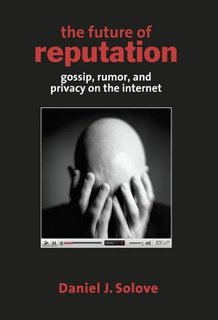
Personal Injury Law Round-Up #39 is up at Perlmutter & Schuelke, with another great collection. Seventeen different stories dead on point plus a half dozen unrelated fun and interesting things tossed in for good measure.
December 7th, 2007
December 7th, 2007

Personal Injury Law Round-Up #39 is up at Perlmutter & Schuelke, with another great collection. Seventeen different stories dead on point plus a half dozen unrelated fun and interesting things tossed in for good measure.
December 6th, 2007
 There are portions of Dan Solove’s new book that should be required reading. Not for lawyers, but for high school and college students.
There are portions of Dan Solove’s new book that should be required reading. Not for lawyers, but for high school and college students.
Solove’s book, The Future of Reputation: Gossip, Rumor, and Privacy on the Internet, starts with a good kick-in-the-pants to anyone who ever thought about writing online. But it’s much more than that, for it’s subjects are not just those who choose to expose themselves, but also those who are exposed by others. Gossip and rumor can spread from any corner of public or private life, as Solove demonstrates in a series of horror stories about people whose lives have been completely, and unexpectedly, upended by others writing about them. And it ends most sadly for those whose lives, secrets or peccadilloes have been exposed, as the avenues of legal redress are few and far between.
The two part book breaks down to identifying how reputations and lives can be destroyed in Part 1, and suggests legal solutions in Part 2.
The horror stories of Part 1 are gripping examples of issue identification, from the girl whose dog poops on the subway and the way a story about her rocketed around the Internet, to the lawyer-boyfriend who saw his ex kiss-and-tell on the web, for the whole world to see. Grouped together without the social sciences research that Solove intersperses with it, it would make for a fast and powerful lesson for rookie writers who are thinking of publishing anything on the web.
But it goes well beyond those that are writing, for as Solove discusses the norms of society, one can see how those norms would themselves change as each of us becomes better aware of the destructive power of information unleashed into this medium. If the fear of public shame on the Internet were fully realized, for example, folks may not be quite so careless with words, or with cars, or with relationships. If your anger at a fender-bender could be caught on a cell phone camera, would you vent the way your emotions are asking you to vent?
While Solove looks in Part 2 for the legal solutions and framework for protecting people — such as providing a better means for some people to bring complaints or lawsuits against those that expose private information — part of the solution may itself lie in the change of norms that would come with the full appreciation of the destructive power of the Part 1 stories. This could itself lead people to peacefully reach resolutions and accommodations where an all-out litigation war might have previously been started. An example of this can be found in Carolyn Elefant’s Law.com column: Who Needs a Lawsuit for Excess Fees When You’ve Got the Internet? Though one might just as easily conceptualize how a messy divorce could be played out in full for the world, forever damning people’s names to Googlehell. Since exposure cuts both ways, of course, it may lead people to think twice about what they are doing.
Some of Solove’s ideas on the legal solutions are unworkable though. A prime example comes in the context of allegedly defamatory comments that are left by others. At present, bloggers and website owners have immunity for anything posted by others under section 230 of the Communications Decency Act passed in 1996. (Though if bloggers screen the comments before publishing, it is possible they could be deemed an editor and subject to liability, an issue that Solove misses that I believe is being litigated in a couple of places.)
Solove says this immunity is too strong, and suggests a format where the blogger could contact the owner of the blog or website and ask that the defamatory comment be taken down, and if the request is refused, the site owner could then be sued. Of course, the owner is in no position to have a trial to find out if the allegedly defamatory statements are true or not, and therein lies the problem.
My suggestion for Solove: Keep this book for the lawyers and legal theorists, but create a second version focused on Part 1, targeted toward high school and college students. Let them gain a more full understanding of the power of the medium, and appreciate that those innocent comments they make on Facebook or MySpace about their personal lives could stick around for decades. If they asked themselves a single question — How will this look in 25 years? — it may save an awful lot of reputational harm in the future.
On a final note, I found the book particularly interesting since I started thinking about these issues prior to the passage of the CDA protections when I was doing a little work for The Motley Fool, an online financial forum. There was no law and no precedent for the multitude of issues that would crop up in areas such as copyright infringement, defamation and jurisdiction. It was a spectacular exercise in issue identification.
With Solove’s book, I see the results of some of those issues I first dealt with over 10 years ago. But the reach of a financial forum dwarfs that of a blog. And that made it a welcome read.
Links to this post:
responses to blog reviews of the future of reputation: part iii
in this post, i’ll be responding to a few more reviews of the future of reputation: gossip, rumor, and privacy on the internet. this is the third installment (for more responses to reviews, see part i and part ii). …posted by Daniel Solove @ December 14, 2007 3:00 PM
daniel solove’s the future of reputation
daniel solove’s solution to the potential problem of damning information on the internet is to open up the libel laws and to remove the communications decency act safe-harbor for site owners. as amber taylor points out in a provocative …posted by @ December 07, 2007 6:28 AM
December 6th, 2007
Random Notes is for subjects I want to blog about or rebroadcast, but just don’t have the time to do well. They will appear on a, you guessed it, random basis:
New York AG unveils Project Sunlight, exposing the lobbyists, pork and money flows in Albany in a very user-friendly website (via NYT-CityRoom);
New York AG also confirms having no sense of humor when it comes to lawyer advertising, a fact I pointed out in March (New York Responds to Lawsuit Challenging New Attorney Advertising Rules — By Banning Humor). Now they’ve filed an appellate brief with the Second Circuit to confirm it (pp. 16-21 of brief);
The Cavalcade of Risk is up at Managed Care Matters – a round-up of insurance blogs and risky stuff;
A fountain of information on the Dickie Scruggs indictment can be found at Overlawyered and at the Insurance Coverage Law Blog;
Scott Greenfield of Simple Justice fame is interviewed at Kevin O’Keefe’s Real Lawyers Have Blogs and reveals an essential truth about blogging: The harder people try to promote themselves, the more their blogs suck. Except he said it nicer. “Nobody wants to read posts about what a wonderful lawyer you are or how brilliant you are. If you’re brilliant, show it by posting substantive pieces.” Naturally, Greenfield has a slightly different take on the interview.
Legal Antics resuscitates a 1990-1 Yale Law Journal article on why you shouldn’t go to law school (with a tip to Susan Cartier Liebel of the Build a Solo Practice)
Evan Schaeffer on how to stop coaching at depositions with the “speaking objection.”
December 4th, 2007
 Actor Dennis Quaid has brought suit against Baxter Healthcare. Last week I wrote of the medical malpractice that had been committed against his hospitalized newborn twins and the labelling issues, when an adult dose of the blood thinner Heparin was used instead of an infant dose. There was a 1,000x difference in the dosages. The labels are similar, the adult dose was apparently stored in the pediatric area, and someone didn’t look close enough at the vials.
Actor Dennis Quaid has brought suit against Baxter Healthcare. Last week I wrote of the medical malpractice that had been committed against his hospitalized newborn twins and the labelling issues, when an adult dose of the blood thinner Heparin was used instead of an infant dose. There was a 1,000x difference in the dosages. The labels are similar, the adult dose was apparently stored in the pediatric area, and someone didn’t look close enough at the vials.
Now, according to TMZ, Quaid has sued. But only sued Baxter, and not the hospital. The Complaint is here: Quaid-Complaint.pdf. There are two causes of action: One for strict liability and one for negligence.
A few thoughts on this:
So why wasn’t the hospital sued? My guess is that it’s because they apologized. While many doctors/hospitals still cover-up mistakes (see: Medical Malpractice and The White Coat of Silence) others have come to realize that the simple human acknowledgement of error goes a long way. On the subject of apologies, I wrote back on April 11:
I’ve always believed, based on the manner in which calls come in to my office, that poor communication (bad bedside manner) is the primary reason patients call attorneys. They are angry, or confused, or both.
Now, from an AP story, we find that the hospital had acknowledged the error and apologized. But what did Baxter do? Well, it seems they issued a warning letter to healthcare workers earlier this year. But starkly missing appears to be the human elements of accountability, contrition and acknowledged wrongdoing. And I’m guessing that the Quaid family will start pushing till they get that. Publicly. Because that’s one of the best ways to see that it doesn’t happen to someone else’s kids.
(hat tip: TortsProf)
December 4th, 2007
 Right wing radio talk-show host and tort “reformer” Michael Savage has brought a lawsuit. The infraction? He was quoted by an Islamic group on its website in which he called the Quran a “book of hate” and said Muslims “need deportation.”
Right wing radio talk-show host and tort “reformer” Michael Savage has brought a lawsuit. The infraction? He was quoted by an Islamic group on its website in which he called the Quran a “book of hate” and said Muslims “need deportation.”
Savage (a pseudonym for Michael Alan Weiner), perhaps unaware of the First Amendment, said the Council on American-Islamic Relations (CAIR) had violated copyright law by using the excepts in a campaign to persuade advertisers to stop sponsoring his show, according to this San Francisco Chronicle story. From the article:
Savage calls the Quran a “hateful little book,” says Muslims “breed bombers” and asserts that the religion of Islam seeks to “convert or kill” nonbelievers.
Savage, who claims to have lost $1 million in revenue as a result of the boycott, said in an Associated Press story that “he was talking about Iran president Mahmoud Ahmadinejad and his dangerous and violent brand of Islamic extremism, not about the religion in general.”
The vitriolic segment was apparently a medley of statements from different broadcasts, and not a single 4-miute spewing. Savage, who apparently has a history of attacking those he disagrees with, is upset now that the roles are reversed.
The lawsuit, according to many portions of the Complaint at the Daily Kos, claims:
“The CAIR misappropriation [of the talk show excerpts] was done for political purposes unrelated to civil rights … [but instead] to raise funds for CAIR so that it could self perpetuate and continue to the (sic) disseminate of propaganda on behalf of foreign interests that are opposed to the continued existence of the United States of America as a free nation.”
At the Savage website, there is an announcement of the suit trying to silence the Islamic site, accompanied by a “Legal Defense Fund” to “Support Freedom of Speech.” George Orwell, it appears, is alive and well.
And on the tort “reform” front, Savage has had this to say:
“Pass tort reform now. Lawyers are important to a society of laws. But lawyers are like red wine. Everything in moderation. Today we have far too many lawyers, and we’re suffering from cirrhosis of the economy.”
Note to Savage: My use of your book cover as an illustration constitutes fair use. I recognize, of course, that getting people to write about you and buy yoru stuff may have been the real point of the lawsuit.
(hat tip to Rhymes with Duck )
Links to this post:
more civil justice in the blogosphere
eric turkewitz discusses two new cases and what they have to do with tort “reform”: one filed by actor dennis quaid and the other filed by radio personality and tort “reformer” michael savage. turkewitz discusses why quaid’s medical …posted by Kia Franklin @ December 05, 2007 2:19 PM